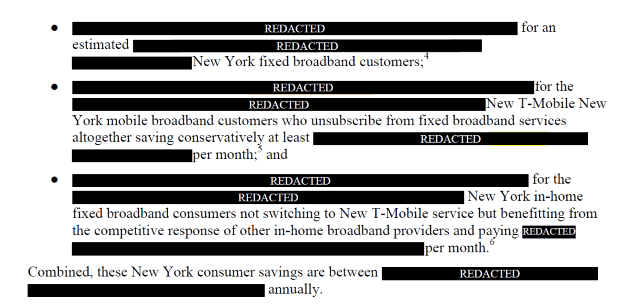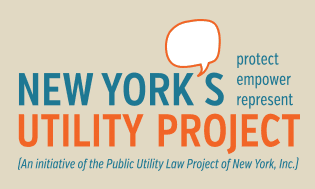 A dispute is emerging in New York between Sprint and T-Mobile and the Communications Workers of America (CWA) and pro-consumer group the Public Utility Law Project (PULP) over the wireless companies’ attempt to argue for their merger deal in a partly secretive filing not open to review by the public.
A dispute is emerging in New York between Sprint and T-Mobile and the Communications Workers of America (CWA) and pro-consumer group the Public Utility Law Project (PULP) over the wireless companies’ attempt to argue for their merger deal in a partly secretive filing not open to review by the public.
In a joint letter signed by Richard Brodsky, on behalf of the CWA and Richard Berkley, on behalf of PULP, the two groups argue Sprint’s initial summer filing promoting its merger did not come close to meeting the state’s burden of proof that allowing the two companies to join forces would be good for New York consumers. But even worse, the two wireless companies are now trying to introduce new arguments in favor of their merger, while redacting them from public view and comment.
“The use of the public comment process to recast the Petition, to attempt to repair the fatal defects in the Petition, and to insulate this new information from public comment is fundamentally unfair,” the two men wrote. “This maneuver deprives Parties of the opportunity to respond to the full set of arguments and assertions made by the Joint Applicants; it undermines the usefulness and value of the public comment policies so fundamental to the Commissions’ history and values and the proper conduct of a rulemaking proceeding; it is not contemplated by Commission rules; and it sets a precedent for future misuse of comments to short-circuit full public analysis.”
The companies filed what they called “comments” on Nov. 16. Detailed information about how the merger will impact on New York consumers was left redacted:

Sprint and T-Mobile’s arguments regarding the consumer benefits of its merger for New Yorkers remain a public mystery. The companies redacted this submission to keep the prying eyes of average consumers from reading it.
The CWA and PULP are asking the Commission for an order that:
1) Requires the Joint Applicants to provide unredacted submissions or to withdraw any document relying on redactions; and/or
2) Convenes an evidentiary hearing permitting examination and testimony relating to the Petition and the submission; and/or
3) Grants our previous request for a formal Public Hearing on the Petition and the submission; and/or
4) Removes from the record the Joint Applicants’ November 16 submission from the record; and/or
5) Extends the deadline for Notice and Comment in the October 19 Order to December 15, 2018; and/or such other relief as the Commission may order.
 The merger of the two wireless companies requires state and federal approval. Alaska, Colorado, Delaware, Georgia, Louisiana, Maryland, Minnesota, Nevada, Texas, Utah, West Virginia and the District of Columbia have already essentially “rubber-stamped” approval of the merger deal with little comment. Pennsylvania regulators submitted a series of questions that the two companies answered earlier this week.
The merger of the two wireless companies requires state and federal approval. Alaska, Colorado, Delaware, Georgia, Louisiana, Maryland, Minnesota, Nevada, Texas, Utah, West Virginia and the District of Columbia have already essentially “rubber-stamped” approval of the merger deal with little comment. Pennsylvania regulators submitted a series of questions that the two companies answered earlier this week.
Sprint and T-Mobile are having a tougher time dealing with regulators in New York and New Jersey, however — the two most likely to either deny approval or impose significant deal conditions in approving the transaction. A review is pending in California, which routinely asks a lot of questions but rarely opposes telecommunications company mergers. Hawaii and Mississippi will also examine the merger in the near future, but neither are expected to oppose it.
New York regulators are likely to consider the impact of the merger on the availability of affordable cellphone plans, the Lifeline program that offers discounted phone service for the poor, and how the transaction will affect rural wireless service in upstate New York.


 Subscribe
Subscribe